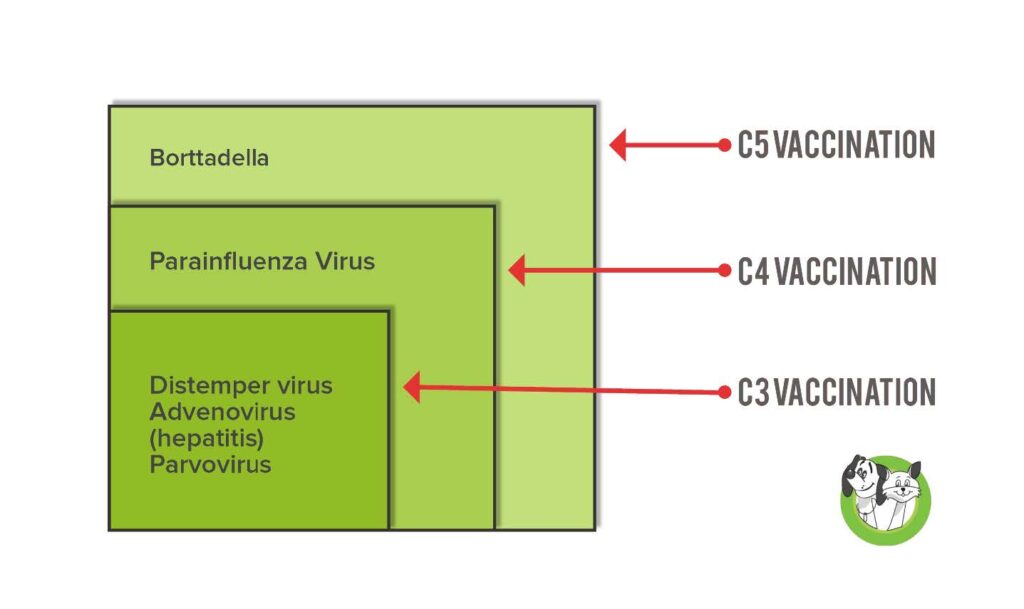Vaccinations play a vital role in the overall health of our pets. It is important to keep them up to date, as the diseases they protect them from can be life-threatening, or cause long-term, chronic problems. Thanks to modern medicine, these viruses are much less common nowadays. Developing a vaccine means they have been almost fully eradicated in populations with high vaccine rates. Areas with wildlife, and strays, or low vaccine rates will generally always pose a risk to herd immunity so it is essential to keep your pet up to date to prevent them from becoming abundant again.
Immediate, aggressive Veterinary treatment is usually required to give the dog the best chance of survival if they contract any of the viruses described in this article – because unfortunately, once diagnosed, there is no cure available. The only approach for treatment is symptomatic care, to try and reduce the intensity of the clinical signs.
Read on to find out more about the common viruses found in dogs and the vaccines developed to prevent them.
Distemper
Distemper is a debilitating viral infection that sees nearly 50% of cases succumb to it. Not only does it have high mortality, but also high transmission rates. This can be through coughing and sneezing between a susceptible dog and an infected dog over short distances.
Clinical signs of this disease can vary, but mainly include vomiting, diarrhoea, eyes/nasal discharge, coughing, seizures and other neurological signs. There are few other diseases that cause all these problems simultaneously, and so it’s no wonder why it can be fatal.
Parvovirus
Parvovirus is one of the most commonly recognised viruses dogs can contract. Known by many to cause severe haemorrhagic diarrhoea, it typically presents in young susceptible puppies and can be fatal. Similarly to distemper, it is a highly contagious disease – and additionally, hard to remove from the environment. Parvovirus can live in the environment for up to 8 years in a stable form, and is resistant to most forms of disinfectants, heat and detergent. Transmission occurs via urine, stool, nasal secretion and fleas from an infected dog, and the environment itself, including bedding, cages, food dishes and hands/clothing of people handling an infected dog.
Other clinical signs can include vomiting, lethargy, anorexia, depression and fever, but will most commonly present with the stereotypical bloody diarrhoea. This is the most concerning clinical sign as this symptom can be the actual cause of death in dogs – the resulting intestinal damage leads to dehydration, electrolyte imbalances and septicaemia. There has been studies warning that if a dog has not improved by the 3rd or 4th day it has a grave prognosis.
Hepatitis
The word ‘hepatitis’ means inflammation of the liver. But despite the name, it can actually target other internal organs too. It appears, in many ways, very similar to the hepatitis strains humans can contract – but never fear, it cannot be transmitted between species. The dog-version is an infectious canine hepatitis, caused by the Adenovirus-1 family. Transmission occurs via urine, nasal and eye secretion from an infected dog.
There are many, many clinical signs that an infected dog can present with for Hepatitis. The ones you will notice externally include yellow, jaundiced skin/gums/ears, watery eyes/nasal discharge, swelling around head, anorexia, lethargy, depression, and even seizures. All other clinical signs relate to internal body function and can only be recognised through diagnostics.
Canine cough & other variants

Figure 1: Isolation is required if your pet is suspected to have canine cough (Pawsitive Pooch, 2023)
Bordetella bronchiseptica, canine parainfluenza virus and adenovirus encompass the ‘canine cough’ viruses your dog can contract. All these types relate to the respiratory system. Canine cough in particular is known to be virulent and highly contagious, also – so much so, that the vaccine typically only works to reduce the symptoms, rather than prevent your dog from contracting the disease altogether (similar to the human COVID vaccines).
Clinical signs include dry, hacking cough, retching, eyes/nasal discharge, lethargy and lack of appetite. These symptoms can arise for many different reasons, but it’s important to immediately isolate your pet in case it is the contagious canine cough, as it can readily spread to other animals. If you need one of our Veterinarian’s to assess your pet for any of the above symptoms, please let us known beforehand so we can assist you in maintaining social distancing from other dogs when you arrive at the clinic. Until one of our Veterinarians gives you the all clear, this isolation should be carried right through until all clinical signs resolve. Thankfully, the prognosis once diagnosed with the disease is usually always good.
Other variants outside the canine cough types listed above can include Leptospirosis and Coronavirus (not to be confused with our COVID-19!). They act very similarly to the canine cough variants as described above, relating to chest/lung disease – but the prevalence is much less in this area. Vaccination against Leptovirus/Coronavirus (with the Protech C2i) largely depends on individual circumstances and is usually only reserved for farm dogs or high-risk areas.
Prevention
Despite there being no cure available for distemper, parvovirus, hepatitis and canine cough variations, vaccinations have been developed to prevent these ‘unnecessary’ diseases from infecting our pets. See the outline below for the vaccination protocol we follow here at Morayfield Veterinary Clinic.
Please bare in mind, this is our standard procedure we follow, but for individual dogs this may vary depending on Veterinarian’s recommendation at the time. See Figure 1. for a visual representation of the core and non-core vaccines available. On a side note: Leptovirus is classed as a ‘C6’ vaccine, which incorporates all vaccines within C5 too (not pictured in the diagram).
Core Vaccines – Distemper, Parvovirus & Hepatitis
Core vaccines include vaccines that all dogs should be immunised with. It includes Distemper, Parvovirus and Hepatitis. This is called the ‘C3’ vaccine.
Here at Morayfield Veterinary Clinic, the Nobivac DHP is the C3 vaccine we use. At the puppy stage, they will receive the Nobivac vaccines as boosters, and at the adult stage, they will receive the Nobivac vaccines as ‘tri-ennial’ vaccines – meaning every 3 years. See the Vaccination Schedule section below for more information.
Non-core Vaccines – Canine cough (x2), Parainfluenza & Leptovirus
Non-core vaccines include vaccines that dogs are immunised with based on their individual lifestyle and medical history. Technically, the canine cough vaccine is included in the non-core group, but are almost always included with the core vaccines as historically, every family’s dog is always in contact with another at some point.
Currently at Morayfield Veterinary Clinic, we offer a yearly option, in the form of either an intranasal (Nobivac KC) or injectable (Nobivac Pi/Bb). See the Vaccination Schedule section below for more information.

Figure 2. Core & Non-Core Vaccines for a Dog (PetCare, 2023)
Vaccination Schedule – Puppies
Please see below the current vaccination schedules we follow here at Morayfield Veterinary Clinic.
| Vaccination Type | 6-8 weeks old | 12 weeks old | 16 weeks old |
|---|---|---|---|
| Nobivac DHP | X | X | X |
| Nobivac KC* | X | X |
* can be swapped to an injectable Nobivac Pi/Bb. If a Protech Pi2/Bb is given at 2nd vaccination, it needs to be boostered at the 3rd vaccination
Vaccination Schedule – Adults
| Vaccination Type | Year 1 | Year 2 | Year 3 | Year 4 |
|---|---|---|---|---|
| Nobivac DHP | X | X | ||
| Nobivac KC or Nobivac Pi/Bb | X | X | X | X |
Please note: puppies/adult dogs with overdue/unknown vaccination history will be vaccinated at the Vet’s discretion. Sometimes boosters are required for adult dogs.
How do vaccines work?
Vaccines in dogs work exactly the same way as they do in humans. In the Veterinary world, there are two types available – inactivated or live vaccines. The former uses a ‘killed’ version of the virus that causes the disease. It is cultured, and created into a strain that removes it’s disease-causing ability. The body then creates antibodies in response to the ‘killed’ virus fragments. Generally speaking, inactivated vaccines are less effective as they don’t exactly mimic the real disease unlike live vaccines.
Live vaccines are a lot stronger, as they include active viral microbes to produce an immune response. Similarly to inactivated vaccines, the body then creates antibodies in response to the ‘live’ virus fragments, but in a more accurate and comparable way to a real life encounter with the virus itself. Booster shots are still required, but not as often as inactivated vaccines.
Most of the vaccines available here at Morayfield Veterinary Clinic are live vaccines. This is to ensure your pet has the best chance of being protected against harmful viruses such as the ones discussed in this article. Despite what you may be thinking, live vaccines are rigorously tested in the lab before becoming available to Vet clinics, so there is little risk of any serious adverse effects occurring. Adverse effects are completely unpredictable and occur much less often than side effects. This can include severe anaphylaxis or sudden death.
Side effects of Vaccinations
Now that you know how vaccines work, you can understand that, although rare, there can also be some side effects present in dogs (side effects meaning low harm and expected… with adverse effects meaning serious harm and unexpected). They are usually acute, minor, and pass within a day or two. Symptoms can include localised swelling at the injection site, mild lethargy, fever and loss of appetite. A prompt re-visit with one of our Veterinarians is always recommended, as most of the time these side effects can be counteracted with appropriate medication.
Call the clinic today if you have any further queries regarding this topic!

Figure 2: Your pet can feel under the weather after a vaccine (Safe Journey Dog Boarding, 2023)
References
https://www.petcare.com.au/puppy-vaccinations/
https://vcahospitals.com/know-your-pet/distemper-in-dogs
https://www.ctvsh.com/services/blog/infectious-hepatitis-dogs
https://www.wcrah.com/site/blog-flat-rock-vet/2020/10/30/hepatitis-dogs-symptoms-prognosistreatment
https://www.vin.com/vetzinsight/default.aspx?pid=756&Id=9522317
https://progressivevetcare.com.au/about-us/services/pet-vaccination.html
